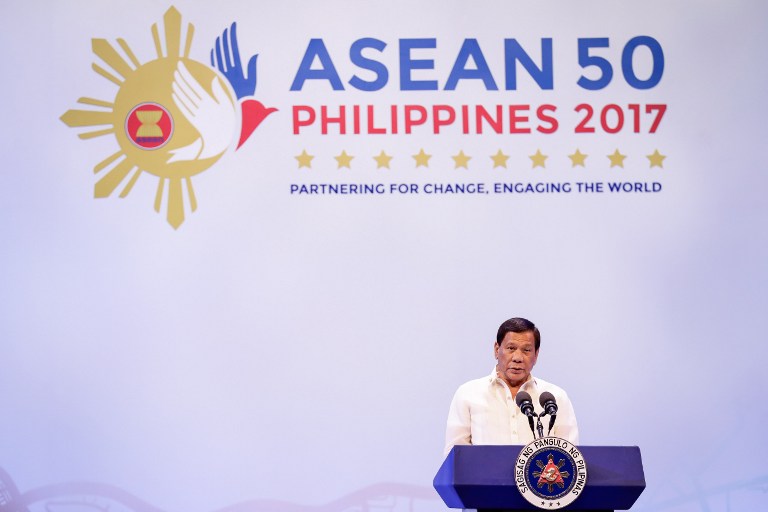
Philippine President Rodrigo Duterte speaks during the opening ceremony of Asean leaders’ summit in Manila on April 29, 2017. POOL PHOTO / MARK R. CRISTINO via AFP)
Members of the Association of Southeast Asian Nations (Asean) reiterated the importance of “maintaining peace, stability, security, and freedom of navigation and over-flight” in the South China Sea but did not mention the UN arbitral ruling negating China claim to much of the disputed territory.
“We took note of concerns expressed by some Leaders over recent developments in the area. We reaffirmed the importance of the need to enhance mutual trust and confidence, exercising self-restraint in the conduct of activities, and avoiding actions that may further complicate the situation, and pursuing the peaceful resolution of disputes, without resorting to the threat or use of force,” the Chairman’s Statement on the 3oth Asean Summit said Sunday.
Also, it said that it took note of “the long-term benefits that would be gained from having the South China Sea as a sea of peace, stability and sustainable development.”
Aside from the Philippines, Asean member countries that are claimants to the disputed seas are Vietnam, Malaysia and Brunei.
A report by Agence France-Presse, citing sources in the diplomatic community, said that the Chinese Embassy in Manila requested the Philippine government not mention international law in the statement and the removal of the phrase “respect for legal and diplomatic processes,” which could refer to the arbitral ruling.
But the report added that other Asean nations were not happy with the chairman’s statement in relation to the South China Sea and even had “hot debates” on the issue.
The statement, which supposedly reflects an agreement of the Asean member states, said that they welcomed “the progress to complete a framework of the Code of Conduct in the South China Sea (COC) by middle of this year, in order to facilitate the early conclusion of an effective COC.”
Several versions of the supposed draft statements had been circulating prior the Asean leaders’ meeting, but this was not immediately confirmed by Palace officials.
It was during the time of President Benigno Aquino III that the Philippines filed a legal protest against China’s nine-dash line claims. During the Asean summits when he was president, a vocal opposition to China’s claim was urged.
But when Duterte assumed office last year, he shifted away from the Philippines’ traditional ally United States and forged closer ties with its rivals China and Russia. He refused to use the Philippines’ victory against China. CBB/atm
RELATED VIDEO
[ventuno id=’OTI4MjMyfHwyMzY4fHwxMDg2fHwxLDIsMQ==’][/ventuno]

